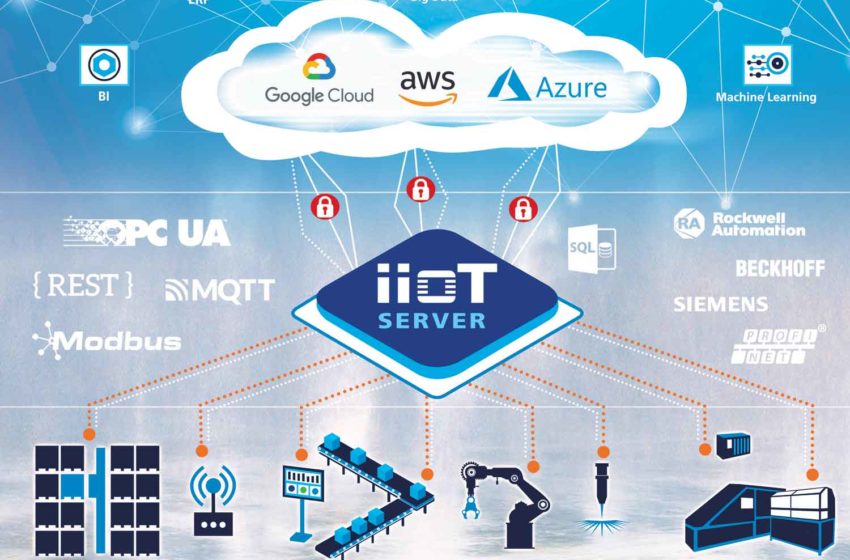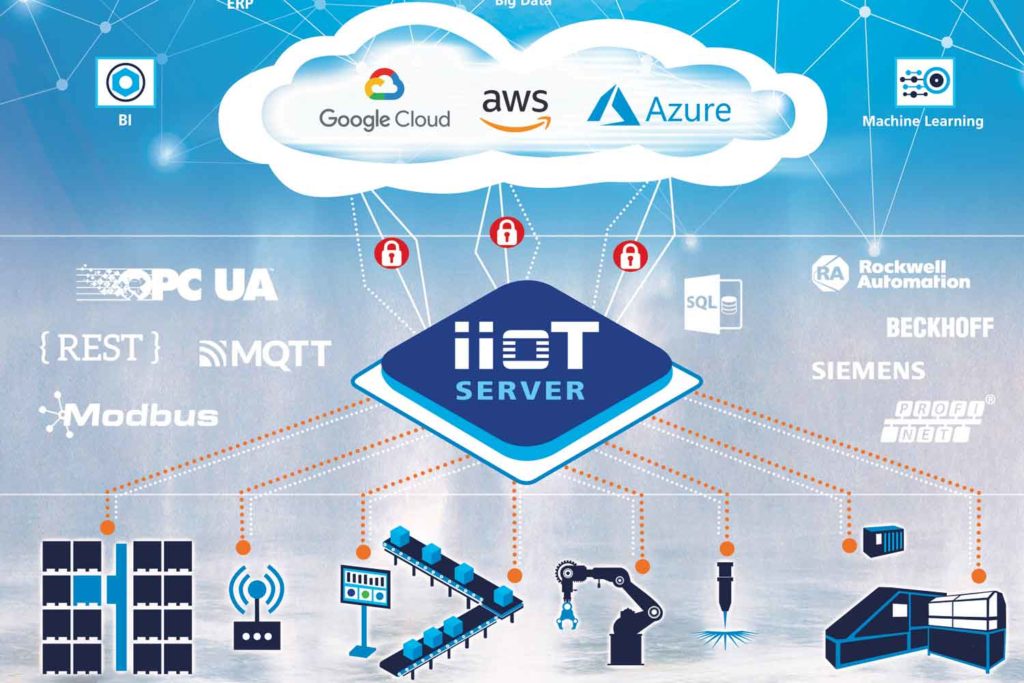Smart Connection
- Also in TR Print Edition Technology
- September 1, 2022
- 0
- 8 minutes read


Koehl’s new communication platform connects field-level tobacco machinery with the Cloud.
By Stefanie Rossel
Communication is key—not only in everyday life but also on the factory floor. On the road to Industry 4.0, the Industrial Internet of Things (IIoT) is an important milestone. The digital mapping of production plants and their connection to systems for collecting and evaluating production data is the basis for smart analysis methods to optimize production processes. To keep up with the fast-paced development of new ideas and concepts that the fourth industrial revolution brings about, manufacturing companies are confronted with the difficult task of driving their digital transformation.
Modern tobacco manufacturing equipment comes with built-in features that allow it to communicate data on performance, settings, history and so on. However, the secondary machinery communication landscape in most tobacco factories is highly fragmented, both for machine-to-machine and machine-to-higher-systems data streams. Over the years, many production lines have formed a heterogenous machine landscape. The individual plant components often comprise controllers from different suppliers and generations. Over time, physical media, protocols and data formats, sometimes proprietary, have accumulated, leading to unnecessarily complex integration efforts. Fragmentation also limits the opportunity to extract manufacturing insights from the machine data.
To solve this problem, the world’s four leading cigarette manufacturers—Philip Morris International, BAT, Japan Tobacco International and Imperial Brands—and the OPC Foundation created a working group about five years ago to describe general requirements for manufacturers for primary and secondary machinery. “OPC” stands for Open Platform Communications. The OPC Foundation is responsible for the development and maintenance of OPC UA, the interoperability standard for the secure and reliable exchange of data in the industrial information space and in other industries. It is a platform-independent, open and license-free communication platform and ensures the seamless flow of information among devices from multiple vendors.
The jointly developed companion specification for the tobacco industry, named Tobacco Machine Communication (TMC), is based on the OPC UA information model and aims at harmonizing data exchange and interoperability requirements for the common benefits of both cigarette manufacturers and original equipment manufacturers (OEMs). It seeks to create interoperability between the various OEMs. The main objective of the companion specification is to provide information-modeling concepts and object libraries that can be applied to model a complete production work center. It covers machine configurations, product flows, setup, service, live status and historical information and can be applied to conventional tobacco products as well as products in the heated-tobacco environment. The OPC UA server of the work center can expose information in a harmonized way to upper-level systems or to other compliant work centers. While the working group started out by focusing on secondary machinery, the new standard 2.0, which was introduced in May, also covers primary equipment.
The TMC standard can be downloaded from the OPC website. All new tobacco machinery delivered today needs to be compliant with the standard.
Enhancing Efficiency

However, cigarette-making equipment is known for its longevity, which means there are many shop floors with equipment that was developed before the standard was introduced. For such factories, Koehl Maschinenbau, a Luxemburg-based supplier of processing and logistics equipment for the tobacco industry, has designed a machine-to-cloud solution, the IIoT Server. Based on the TMC companion specification as a platform, the application server enables vertical data transmission to a business intelligence system (BIS) without, in the best case, changing the components’ programming. This way all data accumulated on the shop floor can be semantically processed in the same way to collect and analyze it centrally. The server collects and handles data at the shop floor level and forwards it to a Cloud or Fog environment where the data is stored, analyzed and archived.
“For the customer, this leads to an increase in efficiency and a reduction of costs,” explains Arno Fries, technical director of logistics and information systems at Koehl. He heads the company’s manufacturing IT department, which implements solutions and products for intralogistics and production logics. The IIoT Server is a proprietary development commissioned by one of Koehl’s tobacco clients. “It’s an easy, flexible, cost-effective and future-proof way to integrate and digitalize established machines into the customer’s preferred Industry 4.0 ecosystem,” says Fries. “An intelligent production optimizes workflows, maintenance, energy consumption and service management.”
The ability to interact with various programmable logic controllers (PLCs) in a heterogenous production environment is key to standardized data processing in the IIoT, says Fries. “The PLC connection module of Koehl’s TMC server is based on a highly flexible and exchangeable driver technology that is used for communication with different PLCs and different protocols. Drivers are available for the most common PLCs, such as Siemens Step-(300, 1200, 1500) or Beckhoff or for protocols, for example OPC UA.”
Easy Installation
The IIoT Server allows for collection of data from all machinery, whether new or old, is OEM independent and provides tailor-made solutions for equipment that is not standard. Transformation and normalization of data take place just in time. There are no programming changes of existing PLCs required. The web-based configuration enables central configurations for all instances. The server consists of a small data processor that fits into a control cabinet, which is required to have two Ethernet ports.
Depending on the customer’s requirements, the IIoT Server can be installed in a decentralized or centralized architecture. In a decentralized installation, each PLC is connected to a separate server unit, with data being transferred from the production network to the cloud in a secure way. In a centralized environment, all PLCs of a production line or an entire plant are connected to a central IIoT Server unit, which according to the company can be easily integrated into existing server or virtualization architectures. Either way, hardware requirements are minimal.
Implementation is uncomplicated, according to Fries. “The data to be transferred and their respective addresses are set once for each PLC through a configuration tool. The storage of the data retrieved by the various controllers and their depiction in the TMC information model is the main characteristic of Koehl’s server application. In addition, it allows for storage of data, which the PLC can neither provide nor store. After configuration, the TMC server runs in the background and provides the configured data as TMC objects to each OPC client for further processing. The operator is not involved unless he wants to add a further configuration.”
Koehl’s server can either be used if existing production lines are to be connected or if an OEM needs a bridge between a machine and the IT level that is compatible with the TMC standard and that he can’t or won’t realize himself.
Successful Pilot Project
The pilot project was installed at an Other Tobacco Products (OTP) manufacturer’s site. Three pilot lines out of nine OTP lines were selected for connection to the cloud-based customer BIS via the TMC standard. For each system, an industrial inter-process communication was placed in the respective control cabinet. “With these having a second network adapter, it was not necessary to take the PLCs out of the production network. The PLCs are therefore accessed via a different network than the data collected here,” relates Fries. “In order to be able to compensate failures of the higher level system, the IIoT Server also allows for the archiving of data movements and changes over a longer period of time.”
Across machines, data about machine running time, downtime and root cause analysis is now collected and can be accessed by the BIS via the TMC standard. Information about material rejects, production defects, material turnover and machine efficiency as well as predictive maintenance and machine configuration changes are also provided.
“The greatest challenge was the collection of data from existing production lines with different controllers without program changes in the PLC,” says Fries. “After we had collected the data, it was validated by the machinery operators, and since then, system has been running smoothly.”
Following the successful pilot, Koehl has been ordered to roll out the system to the customer’s remaining OTP lines. Fries observes increasing interest for his company’s solution in the industry. “If a tobacco manufacturer has several locations and lines and a fully automated production, the IIoT Server is ideal because it not only allows to comply with the TMC standard but also to control and evaluate processes.”

